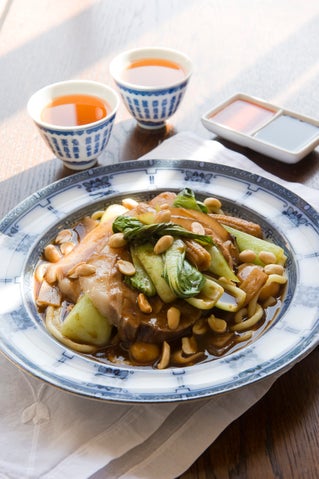Add to Cookbook 

Black bean and garlic pork braise
 15 minutes
15 minutes in the slow cooker low: 8-9 hours, high 4-5 hours, plus extra 30 minutes
in the slow cooker low: 8-9 hours, high 4-5 hours, plus extra 30 minutes 10-12
10-12

A boned well-marbled pork shoulder will cook to perfection in a slow cooker and will tolerate being left longer than planned. Any leftover cold meat has a delicious flavour, imparted from the braising sauce.
Ingredients
- 2 kilograms boned shoulder of pork, skin scored
- ¾ cup chicken stock or water
- ½ cup black bean and garlic sauce
- ¼ cup mirin
- 5 cm piece fresh ginger, peeled and sliced
- 3 whole star anise
- 2 teaspoons cornflour
- 1 tablespoon sherry or water
- 400 gram can whole baby corn, well drained
- 227 gram can water chestnuts, well drained
- 227 gram can bamboo shoots, well drained
- 4 bok choy, halved lengthwise
Method
- Turn the slow cooker on to low to pre-warm while gathering and preparing the ingredients.
- Tie the pork together to ensure it cooks evenly and keeps a good shape while cooking.
- Mix together the stock or water, black bean and garlic sauce and mirin and pour into the pre-warmed slow cooker. Sit the pork on top, scatter in the ginger and star anise and cover with the lid.
- Cook on low for 8-9 hours or on high for 4-5 hours, or until the pork is tender.
- If you have a meat thermometer, pork is cooked when the thermometer reaches 71ºC.
- Remove the pork from the slow cooker, place on a warm plate and cover with foil. Allow the pork to rest before carving and hwile finishing the dish. Turn the slow cooker to high.
- Mix the cornflour with the sherry or water and stir into the cooking liquid in the slow cooker.
- Add the baby corn, chestnuts, bamboo shoots and bok choy and stir well. Cover and cook for a further 30 minutes.
- Cut the pork into generous slices and serve over your favourite Asian noodles with a serving of the black bean sauce and vegetables. Garnish with peanuts if wished, before serving.
Cooks Tips
- Having the pork scored will make carving easier.
- Mirin is often referred to as a rice wine. It is brewed from rice rather than fermented and is used for cooking and not drinking, to impart a unique flavour to glazes and sauces. Sherry can be substituted.


Comments (0)
Please login to submit a comment.